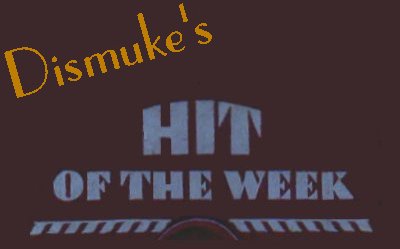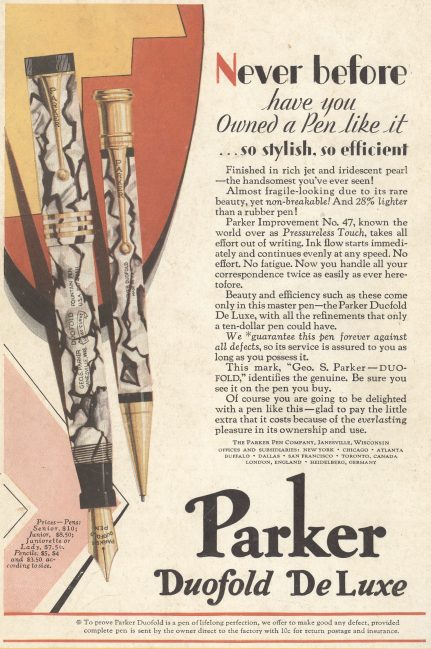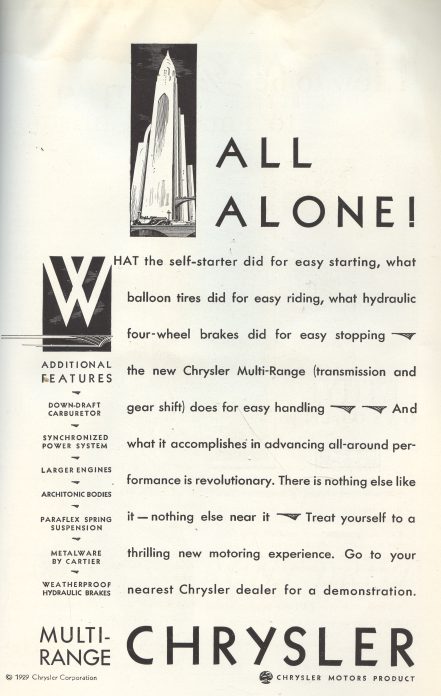

March 2010
March 28
This Hit of the Week update is
brought to you by

(Click
on image for larger view)
Parker
Duofold DeLuxe
....so stylish, so efficient
The Parker Pen Company, Jamesville Wisconsin
(from
1929 ad)
Fess Williams played
several instruments but is best remembered for clarinet style that some
have unfavorably compared with Ted Lewis as well as for incorporating
many of Lewis's vaudeville type antics into his act. His band,
however, featured top notch jazz musians and most of its recordings
would be classified as "hot." Willams was also proficient at a
technique called circular
breathing which gave him the ability to hold a note indefinitely.
During the 1920s
Williams led bands in both Chicago and New York City. His Royal
Flush Orchestra was one of the bands that performed on the opening
night of Harlem's famed Savoy Ballroom on March 12, 1926 where it
became one of its regular house bands. Unlike some of the other
top Harlem nightspots where black musicians catered to a whites-only
crowd, the Savoy welcomed both white and black patrons.
As was the case with
many bands, the Royal Flush Orchestra's recording career ended with the
onset of the Depression and the band made its last recordings in
1930.
Fess Williams was the
uncle of a jazz star of a much later era , Charles Mingus.
This arrangement of
"Ain't Misbehavin'" is quite different in style from the Leo Reisman
version featured two updates ago. Like "Ain't
Misbehavin'," "Sweet Savannah Sue" was composed by pianist Thomas
"Fat's Waller" for the revue Hot
Chocolates which featured an all-black cast and enjoyed a run at
New York's Hudson
Theatre from June 20 - December 14, 1929.
- Dismuke
If you have
questions or
comments about the music or would simply enjoy interacting with
friendly
people who share your interest in it, join in the conversation on Dismuke's
Message Board.
EXTRA
This section
will present
78 rpm recordings that do not fall within the range of the vintage pop
and jazz fare that I usually present. Here I will
feature
recordings from a wide variety of eras, musical genres and
nationalities
as well as occasional spoken word recordings.

"Felicia
Waltz" mp3
stream | Real
Audio
Stream |
Real Audio File
Sergeant Markels'
Orchestra 1917
(Victor 35639 B)
"Forget Me Not" mp3
stream | Real
Audio
Stream |
Real Audio File
McKee's
Orchestra
1917
(Victor 35639 A)
Here is a
record that I recently discovered in a stack I had set aside from
a bulk purchase I made a few years ago. Both sides feature
waltzes arranged in dance tempo - and the record is specifically
labeled "for dancing."
When
I first played"Felicia Waltz" it immediately struck me as a rather
charming song. The composer was Vernon Eville who wrote it in
1916. I have not been able to locate a lot of biographical
information about Eville other than the fact that he had a few other
songs to his credit and, as his "day job," worked as a manager for the
"Professional Department" at the New York office of Boosey & Co.
which was a major music publishing house.
"Felecia
Waltz" is also from the first recording session of bandleader
Mike Markel who would later make a lot of jazz oriented dance band
recordings for the Okeh, Edison and Banner labels. Note that the
typo with the apostrophe on the label credits suggests that the
bandleader's last name was "Markels."
"Forget Me
Not" was composed by Frank W. McKee in 1917 who also leads the band on
this recording. McKee composed several other waltzes during the
1910s and began recording with Victor in 1914. He was also the
conductor of a 1914 Victor recording session of the Castle House
Orchestra, named after the famous dancing team of Irene and Vernon
Castle. The actual orchestra that was associated with
the Castles and their famous Castle House dancing school was led by
groundbreaking black bandleader James Reese Europe whose Vernon Castle
approved Victor recordings were issued under the name Europe's Society
Orchestra. The recording session by McKee's band, which was
all white, was also supervised by Vernon Castle but focused on waltzes,
maxixes and tangos rather than the "hot" style dance music featured on
Europe's recordings. This recording of "Forget Me Not"
comes from McKee's last recording session with Victor. I have not
been able to locate any additional information about him or his band
after that. I am also not sure if his band existed outside of the
Victor recording studios or whether it was a strictly in-house
ensemble.
It took
the Victor Talking Machine Co a while to actually get this record into
the stores. "Forget Me Not" was recorded on May 16, 1917.
"Felicia Waltz" was recorded on November 14, 1917 and the record itself
was not issued until June 1918.
- Dismuke
If you have
questions or
comments about the music or would simply enjoy interacting with
friendly
people who share your interest in it, join in the conversation on Dismuke's
Message Board.
March 14
This Hit of the Week update is
brought to you by
CHRYSLER MULTI-RANGE
Downdraft Carburetor
Synchronized Power System
Larger Engine
Architonic Bodies
Paraflex Spring Suspension
Metalware By Carter
Weatherproof Hydraulic Brakes
(From 1929 ad)
The Colonial Club
Orchestra was a recording pseudonym used on Brunswick records for Bob
Haring and His Orchestra. Haring also conducted the house band
for Cameo Records and its associated labels under a wide variety of
pseudonyms from 1922 until the company's merger with Pathe and Plaza
(i.e, Banner Records) in 1929.
Haring began recording
for Brunswick in 1926 where he occasionally recorded under other names
besides Colonial Club Orchestra. At the time it was not uncommon
for bands to record concurrently for rival labels. Work in the
recording studios was quite lucrative for musicians because, rather
than royalties, they were paid on a per recording basis regardless of
how many copies eventually sold.
By contrast, while
today's musical groups recording for the major RIAA labels might get an
advance on future royalties, they rarely see another penny in terms
until the cost of the advance and the label's heavily padded
promotional expenses have been recouped. As a result, most
artists recording for the major labels make little money from their
recordings unless they happen to have a big seller. Musicians who
were fortunate enough to record regularly during the 1920s and early
1930s made a good living - especially if it was combined with radio and
live performances. "Fortunate" however is the operative word - of
the thousands of bands who were active at any given time during the
dance band era, only a relative handful ever stepped inside a recording
studio. Records and recording technology was still very
expensive and, unlike more recent decades, opportunities to at least
record for "independent labels" were few and usually short lived.
I have wondered if the
name Colonial Club Orchestra was a reference to a nightclub that the
Haring band might have had a long term engagement at or if it perhaps
might have had something to do with a possible radio broadcast
sponsored by the company that made the then popular Colonial Club brand
of shaving cream. However, looking though vintage newspaper
archives, the only mention of the band I can find is in reference to
its Brunswick recordings. Nor have I been able to find any
information to indicate that Colonial Club Shaving Cream sponsored
radio broadcasts. So, apparently, like so many other
recording pseudonyms, it was apparently something that a person
associated with the record company came up with.
Haring made his last
recoding for Brunswick in January 1931. From February though July
of that year he recorded for the American Record Corporation which was
the corporate successor resulting from the 1929 Cameo merger.
Most of his recordings from this period were issued on the Perfect
label. His last recording session was July 8, 1931.
I have only been able
to find a limited amount of biographical information about Bob Haring.
He was born in Mountclair, New Jersey in 1895 and was educated at
University of Washington and the Seattle Conservatory. As late as
the 1960s he was working as an arranger/editor for at least one music
publishing company. He spent his last years in Barryville, New
York residing on "Haring Road" - which perhaps was named after him -
where he died in 1975.
- Dismuke
If you have
questions or
comments about the music or would simply enjoy interacting with
friendly
people who share your interest in it, join in the conversation on Dismuke's
Message Board.
EXTRA
This section
will present
78 rpm recordings that do not fall within the range of the vintage pop
and jazz fare that I usually present. Here I will
feature
recordings from a wide variety of eras, musical genres and
nationalities
as well as occasional spoken word recordings.
"Potpourri Aus Der Operette
Polnische Wirtschaft Part 1" mp3
stream | Real
Audio
Stream |
Real Audio File
Marek Weber Und Sein Orchester
Irene Eisinger and Seigfried Arno, vocal 1928
( Electrola EH 312 mx 4 049314)
"Potpourri Aus Der Operette
Polnische Wirtschaft Part 2" mp3
stream | Real
Audio
Stream |
Real Audio File
Marek Weber Und Sein Orchester
Irene Eisinger and Seigfried Arno, vocal 1928
( Electrola EH 312 mx
4 049315)
Here are
some vocal selections from the now obscure operetta Polnische Wirtschaft by German
composer Jean Gilbert. It debuted on December 26, 1909 in
Cottbus, Germany. On August 6, 1910 the operetta
opened in Berlin at the Thalia-Theater where it enjoyed over 600
performances. According to a 1908 tourist guide,
Thalia-Theater specialized in "farces" and at least once source refers
to Polnische Wirtschaft as a
"vaudeville farce." Apparently the operetta's popularity never
reached outside of Germany as most of the information I have discovered
about it has been through German language websites with help from
Google Translate.
The term
"Polnische Wirtschaft" translates to "Polish economy" or sometimes,
"Polish housekeeping." In Germany, it is used as a derisive
stereotype referring to the alleged backwardness and disorderliness of
the Poles. While the stereotype probably dates back to the late
18th century, during the 1930s Hitler's National Socialists made much
use of it to justify forcibly dividing Poland between Germany and
the Soviet Union. It should be noted that when the operetta
premiered, Poland had not been an independent country since 1795
and its former territory was by then incorporated into Russia, Germany
and Austria-Hungary. Poland did not reemerge as an
independent state until 1918 in the aftermath of World War I. Thus any commentary or
humor that might have been part of the operetta would most likely have
been ethnic and not political in nature.
In 1928 a
German silent film Polnische
Wirtschaft was released which I strongly assume was a film
adaptation of the operetta. The film's cast included
Siegfried Arno who is featured on these recordings. My guess is
the record was issued as a way of capitalizing on the release of the
film.
The
record's label credits Nico Dostal - an operetta composer in his own
right - as the arranger of this medley version.
Dostal was
the only person credited on this recording who was not forced to flee
Germany when the National Socialists came to power. Siegfried
Arno and Marek Weber eventually made their way to the United
States. Irene Eisinger found refuge in Great Britain and Jean
Gilbert emigrated to Argentina.
This is a
recording that I had somehow overlooked in my collection until a few
weeks ago when an unusually heavy snowstorm for Texas left me without
electricty for 40 hours. I suspect it was acquired in a bulk
purchase I made in November and it ended up getting missorted.
One nice thing about 78 rpm records and windup phonographs is that one
can still have entertainment when the power goes out. I
discovered this while spending the evening listening to records by
candlelight. I particularly enjoy the selections featured on Side
2 of this record.
- Dismuke
If you have
questions or
comments about the music or would simply enjoy interacting with
friendly
people who share your interest in it, join in the conversation on Dismuke's
Message Board.
March 11
This Hit of the Week update is
brought to you by

Enjoy Real Coffee and
Restful Sleep
Kellogg's
KAFFEE HAG
COFFEE
(from
1931 ad)
Here are two songs
that have continued to endure as jazz standards and have been
recorded by countless performers over the decades.
Thomas "Fats" Waller
wrote and recorded a piano version of "Ain't Misbehavin'" in
1929. Waller later performed the song in the 1943 film Stormy Weather. In 1978
it was revived as the title song of the successful musical Ain't Misbehavin' which paid
tribute to 1920s and 1930s era black jazz musicians.
This Leo Reisman
version is one that has been in my collection for quite a
while. Initially, the recording did not particularly impress me
and was rarely played. It is definitely less jazzy
than most early recordings of the song and even has a borderline
"sweet" quality to it - which makes sense given that Reisman's
band was a hotel society orchestra. Awhile back I
gave the record another listen and was surprised at how much I enjoyed
it. Oddly enough, the same "sweet" aspects of the recording which
made me initially dismiss it as "dull" were what I found most appealing
about it.
"Star Dust" ranks an
one of the most recorded pop songs of all time with over 1,800 versions
having been made. Hoagy Carmichael composed and made the first
recording of the song as an instrumental in 1927. Lyrics by
Mitchell Parish were added in 1929.
Over the years, the
song's name has been contracted to "Stardust" and is usually performed
as a slow ballad. Many of the early recordings of the song,
however, were performed as a peppy, upbeat fox trot as is the case with
this version by Wayne King and His Orchestra. This
recording is somewhat unusual for the Chicago based Wayne King band
which was best known for playing waltzes and slow tempo arrangements
which appealed to Midwestern audiences with conservative musical
tastes.
- Dismuke
If you have
questions or
comments about the music or would simply enjoy interacting with
friendly
people who share your interest in it, join in the conversation on Dismuke's
Message Board.
EXTRA
This section
will present
78 rpm recordings that do not fall within the range of the vintage pop
and jazz fare that I usually present. Here I will
feature
recordings from a wide variety of eras, musical genres and
nationalities
as well as occasional spoken word recordings.
Bleeding
Hearted Blues mp3
stream | Real
Audio
Stream |
Real Audio File
Bob Wills And His Texas Playboys
Tommy Duncan, vocal
1937
(Vocalion 03597 mx Dal
218)
Dedicated
To
You
mp3
stream | Real
Audio
Stream |
Real Audio File
Bob
Wills And His Texas Playboys
Bob Wills, vocal
1937
(Vocalion 03597 mx Dal
214)
Bob Wills
was one of the pioneers and most famous names in Western
swing, a musical genre which combined elements of
jazz oriented dance bands with traditional country or "hillbilly" music
as it was then known. Western swing was extremely popular
in Texas, Oklahoma and the American Southwest.
Bob Wills'
first band, the Light Crust Doughboys, was formed in Fort Worth,
Texas in 1931 and named after Light Crust Flour which sponsored
the band's popular broadcasts on a local radio station. One of
the band's members was Milton Brown who left in 1932 to form his own
highly successful Western swing band, the Musical Brownies.
Wills
frequently clashed with his boss at Light Crust Flour, future Texas
governor W. Lee "Pappy" O'Daniel and left the Doughboys in 1933
to form a new band, the Texas Playboys which found success in Tulsa,
Oklahoma with daily broadcasts from Cain's Ballroom
over
the
far
reaching
50,000 watt signal of radio station KVOO.
Both of
these sides were recorded in Dallas, Texas in June, 1937, most likely
in this
still
standing
but
endangered
building prior to the
widespread availability of air conditioning. One of the musicians in
the band, Marvin "Smokey" Montgomery, recalled that the studio was
swelteringly hot with two fans blowing across large blocks of ice in an
attempt to provide at least some sort of relief from the heat.
Most of
the vocals on Bob Wills recordings were performed by Tommy
Duncan. Neither the record's label nor the discography I
consulted provides vocal credit for either of these sides - but I
suspect that both are by Duncan. The voice talking and making
high pitched yells in the background on both recordings is Bob Wills.
"Bleeding
Hearted Blues" was composed by Lovie Austin and recorded in 1923 by
Bessie Smith. Wills was a big fan of Bessie Smith and once rode
on horseback to see her perform live in Childress, Texas.
Update -
3/14/10: a visitor was kind enough to
inform me that the vocal on "Dedicated To You" was by Bob Wills.
I have subsequently located discographical information that confirms
that as well as the fact that the vocal on "Bleeding Heart Blues" is by
Tommy Duncan.
- Dismuke
If you have
questions or
comments about the music or would simply enjoy interacting with
friendly
people who share your interest in it, join in the conversation on Dismuke's
Message Board.
March 7
This Hit of the Week update is
brought to you by

(Click on image for larger view)
GENERAL
ELECTRIC
ALL-STEEL REFRIGERATOR
(from 1929 ad)
Only
Love Is Real
mp3
stream | Real
Audio
Stream |
Real Audio File
Jesse Stafford And His Orchestra
1929
(Brunswick 4658)
Should
I
mp3
stream | Real
Audio
Stream |
Real Audio File
Jesse Stafford And His Orchestra
1929
(Brunswick 4658)
Here are a couple of
songs featured in the 1930 MGM musical film Lord Byron of Broadway.
While the film was considered to be a major "flop" quite a few artists
recorded its songs.
Jesse Stafford was the
trombonist for the Herb Wiedoeft Orchestra, a popular West Coast
band. In 1928 Wiedoeft was killed in a car wreck and Stafford
emerged as the band's new leader. Though these recordings were
made on November 17, 1929, the band still sounds very much like the old
Herb Wiedoeft Orchestra. While the Jesse Stafford band
continued through 1937, it stopped recording in 1931, most likely
as a result of the Depression's impact on record sales.
- Dismuke
If you have
questions or
comments about the music or would simply enjoy interacting with
friendly
people who share your interest in it, join in the conversation on Dismuke's
Message Board.
EXTRA
This section
will present
78 rpm recordings that do not fall within the range of the vintage pop
and jazz fare that I usually present. Here I will
feature
recordings from a wide variety of eras, musical genres and
nationalities
as well as occasional spoken word recordings.
Countess
Maritza Selection Part 1 mp3
stream | Real
Audio
Stream |
Real Audio File
Marek Weber And His Orchestra
1929
(Victor 36094 A)
Countess
Maritza
Selection
Part
2
mp3
stream | Real
Audio
Stream |
Real Audio File
Marek Weber And His Orchestra
1929
(Victor 36094 B)
Here is a
nice instrumental medley of tunes from the Emmerich Kálmán
operetta Countess Maritza
(Gräfin
Mariza) which debuted at
the Theater an der Wien in Vienna on February 28, 1924.
Marek
Weber's Orchestra has been featured in a number of previous updates.
Weber was a Polish born violinist based in Germany who led
one of Europe's most famous salon
orchestras prior to having to his having to flee when the
National Socialists came to power. During the 1920s,
Weber regularly appeared at high profile Berlin venues such as Hotel
Adlon and Hotel
Esplanade. After leaving Germany, Weber toured Europe and
eventually emigrated to the United States in 1937. For awhile,
Weber appeared on network radio billed as "Radio's Waltz King" before
he retired from the music business and purchased a farm. Weber
was not fond of jazz music but nevertheless did occasionally record
jazz oriented fox trot recordings.
Salon
orchestras had a much broader popular appeal in Europe than the did in
the United States - and I find European recordings of this genre to be,
on balance, much more enjoyable than those of American salon orchestras
of the period such as the A&P Gypsies and Nat Shilkret's Victor
Salon Orchestra
If you have
questions or
comments about the music or would simply enjoy interacting with
friendly
people who share your interest in it, join in the conversation on Dismuke's
Message Board.

|




